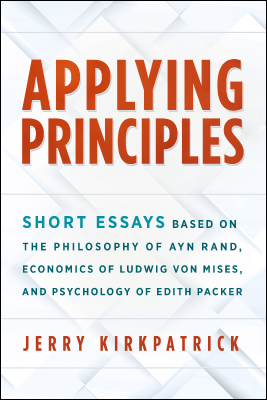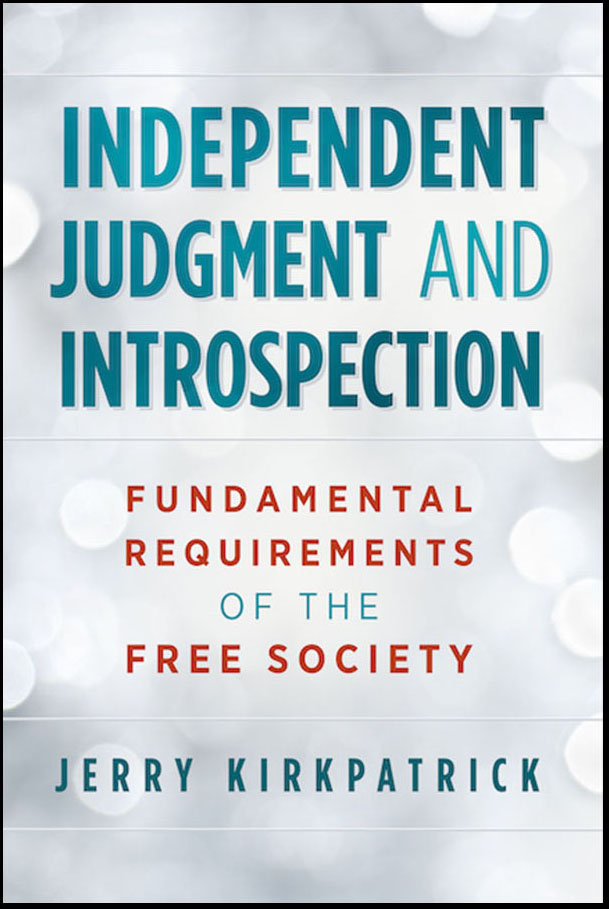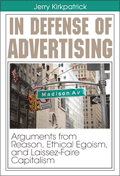Info Below • Reviews • Preface • Excerpt • Behind the Scenes
In Defense of Advertising:
Arguments from Reason, Ethical Egoism, and Laissez-Faire Capitalism
Paperback Edition - Free pdf ebook
Available Now - Amazon, B&N
Info Below • Preface • Excerpt • Behind the Scenes
Applying Principles:
Short Essays Based on the Philosophy of Ayn Rand, Economics of Ludwig von Mises, and Psychology of Edith Packer
Free pdf ebook
by Jerry Kirkpatrick, Ph.D., Professor Emeritus of International Business and Marketing, California State Polytechnic University, Pomona (Cal Poly Pomona)
Uniting Theory and Practice
Info Below • Reviews • Preface • Excerpt • Behind the Scenes
Silver Winner, Psychology, IBPA Ben Franklin Awards
Independent Judgment and Introspection:
Fundamental Requirements of the Free Society
by Jerry Kirkpatrick, Ph.D., Professor Emeritus of International Business and Marketing, California State Polytechnic University, Pomona (Cal Poly Pomona)
"Insightful and beautifully written"*
Hardcover $34.95, Softcover $16.95, Ebook $6.99
Buy: Amazon, Barnes & Noble, IndieBound
Ebook: Kindle, Apple Books, B&N Nook, Kobo, or Smashwords
Libraries: Ingram or Baker & Taylor

Why do I self-publish? Read answer here.
Also by Jerry Kirkpatrick
Applying Principles is a collection of short essays published between January 2007 and December 2016 as monthly blogposts at jerrykirkpatrick.blogspot.com. The author's aim was to write interdisciplinary, serious posts to inspire critical thinking. Topics, grouped as chapters, range from capitalism and politics to epistemology, academia, education, psychology, youth sports, and the arts.
The title derives from the author's thirty-six years as educator in the applied science of business marketing. Applied sciences, the author realized early in his career, require a deductive process of applying general, more fundamental principles to specific issues. The business disciplines rest on economics and psychology, and those two in turn, as all sciences, rest on philosophy.
The essays therefore are not journalistic, though many deal with recent issues; they apply fundamental ideas to concrete areas. Examples: “Choice Theory and Capitalism versus Dictatorship,” “The Ethics and Epistemology of Peer Review,” “Interest and the Core Curriculum,” “Ensuring that Disposition Trumps Situation,” and “Nutrition and the Argument from Uncertainty.”
Posts included in “youth sports” came about because the author's daughter played softball; many comments bring up issues in psychology. And “the arts”—only two posts—stem from the author’s lifelong interest in music.
Applied science gathers all relevant concrete facts of the specific case it is working on, then uses, that is, applies, the universal concepts and principles of the fundamental sciences on which it rests, plus the narrower concepts and principles of its discipline. (First published October 1, 2021)
Preface • Excerpt • Behind the Scenes • Top of Page
CONTENTS: Preface; Capitalism and Politics; Academia; Education; Psychology; Epistemology; Youth Sports;The Arts; Index (382 pp).
Hardcover: $34.95, Softcover $16.95, Ebook $6.99
Buy: Amazon, Barnes & Noble, IndieBound
Ebook: Kindle, Apple Books, B&N Nook, Kobo, or Smashwords
Libraries: Ingram or Baker & Taylor
What Kind of Psychology Is Required for the Survival of Free Societies?
One that correctly identifies reality—the world external to our minds, as well as our minds’ internal contents and processes—to guide our choices and actions to live happy, healthy lives.
Free, unhampered market societies require citizens who possess an unhampered consciousness, that is, citizens who possess and practice a strong commitment to facts, expressed as independent judgment and independent action. To ensure that we develop and maintain an independent personality, and therefore will support a free society, we must learn the skill of introspection to identify and correct, or preferably prevent, mistaken thinking.
Flawed conclusions about life’s events cause anxiety, thwarting and constricting our lives, often leading to dependence and unhappiness, which also often means a diminished likelihood of valuing or accepting individual freedom. The virtues of psychological independence are integrity, courage, and a refusal blindly to obey authority.
This book argues that psychological independence and its monitoring skill, introspection, are indispensable prerequisites of the free society. (First published October 1, 2019)
Reviews • Preface • Excerpt • Behind the Scenes • Top of Page
CONTENTS: Preface; The War on Independence; Psychology for a Free Society; The Psychology of Independence; Mistaken Conceptions; Educating for Independence: Appendix; Bibliography; Index (204 pp).
Hardcover $34.95, Softcover $16.95, Ebook $6.99
Buy: Amazon, Barnes & Noble, IndieBound
Ebook: Kindle, Apple Books, B&N Nook, Kobo, or Smashwords
Libraries: Ingram or Baker & Taylor
What Is the Ideal Education System?
One that rejects the premise of obedience to authority. Not just in teaching, but also in parenting and in all social relations. Just as an ideal social system would allow citizens to pursue their values without interruption or control from an outside authority, namely the state, so also the ideal education system should allow children and students to concentrate without interruption on the learning tasks that interest them. Neither coercing nor neglecting them, the role of the adult is to guide and nurture the young to develop the confidence and independence required for an adult life in a capitalist society.
Montessori, Dewey, and Capitalism presents a philosophy of education—the theory of concentrated attention and independent judgment—that requires laissez-faire capitalism for its full realization. It is not an argument, except indirectly, for the separation of education and state nor is it a critique of present and past state-run schooling. It is an argument for the abolition of coercion in all areas of life. (First published February 1, 2008)
Reviews • Preface • Excerpt • Behind the Scenes • Top of Page
CONTENTS: Preface; Acknowledgments; Capitalism and Education; Historical Origins; Foundations; The Theory; Bureaucracy and Education: Independent Judgment; Bibliography; Index (212 pp).
Hardcover $42.95, Softcover $18.95, Ebook $1.99
Buy: Amazon, Barnes & Noble, IndieBound
Ebook: Kindle, Apple Books, B&N Nook, Kobo, or Smashwords
Hardcover for libraries: Ingram or Baker & Taylor
That's what the social and economic critics seem to think.
You've heard the complaints. Advertising is coercive, offensive, and monopolistic. It sends subliminal messages to force us to buy what we don't need or want, it creates the needs and wants it tries to satisfy, it is offensive to good taste and should be banned or regulated, it creates barriers to market entry, and it increases prices.
In Defense of Advertising by Jerry Kirkpatrick takes on the critics and concludes that advertising is fundamentally benevolent.
The book is a an unapologetic theoretical defense, based on the Objectivist philosophy of Ayn Rand and the Austrian economics of Ludwig von Mises. It argues that the proper foundations of advertising are reason, ethical egoism, and laissez-faire capitalism, and its theme is that the so-called social and economic criticisms are false because they are based on a false philosophic and economic world view. Only an alternative world view can validly refute the charges and put forth a positive moral evaluation of advertising's role in human life. The author defends advertising precisely because it appeals to the rational self-interest of consumers for the rationally selfish, profit-making gain of the capitalists. (Paperback edition published January 2, 2007; hardcover March 30, 1994)
Reviews • Preface • Excerpt • Behind the Scenes • Top of Page
CONTENTS: Preface; The Original Sin of Capitalism; Two Philosophic World Views; The Alleged Coercive Power of Advertising; The Alleged Offensiveness of Advertising; The Economic Foundations of Advertising: Three Views; Refuting the Doctrine of Pure and Perfect Competition; The Alleged Monopoly Power of Advertising; The Benevolence of Advertising; Bibliography; Index (204 pp.).
In Defense of Advertising was originally published in hardcover in 1994 by Quorum Books, an imprint of Greenwood Publishing Group, Westport, CT. In 1997, In Defense of Advertising was translated into Portuguese and published in Brazil as Em Defesa da Propaganda; Kirkpatrick was invited to Rio de Janeiro for the launch of the translation, for interviews with the local media, and for a book signing.
Read the foreword and dust jacket comments to Em Defesa da Propaganda.
Softcover $16.95, Ebook $1.99
Buy: Amazon, Barnes & Noble, IndieBound
Ebook: Kindle, Apple Books, B&N Nook, Kobo, or Smashwords
Libraries: Ingram or Baker & Taylor
*Carleen Glasser, MA, CTRTC, William Glasser, Inc., www.wglasserbooks.com
**Ron Miller, author, Free Schools, Free People: Education and Democracy after the 1960s
***ForeWord Magazine, May-June 2007.
THE AUTHOR: In addition to his thirty-six years in education, Jerry Kirkpatrick worked over seven years in business as account executive for a public relations mailing service in New York City and at two direct marketing firms in Los Angeles. In high school Kirkpatrick was inspired to think about fundamental ideas, so he majored in philosophy as an undergraduate before pursuing his advanced degrees. He now writes a monthly blog at jerrykirkpatrick.blogspot.com, discussing, among other topics, his special interests in epistemology and psychology.
Top of Page










